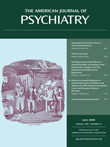To The Editor: When applying for asylum in a new country, refugees are interviewed by immigration authorities about events they experienced prior to emigrating. Since there is usually no documentary evidence regarding past traumatic events experienced in the country of origin, legal decision pertaining to status may rest on the credibility of the applicant’s narrative. If an applicant gives different (discrepant) accounts of their experiences on different occasions, it is easy to assume that they have fabricated a story in an attempt to obtain a residency permit
(1) . However, a study of a sample of 39 asylum seekers from the Balkans in the United Kingdom has convincingly shown that such inconsistencies between different interviews should not be relied upon as indicating a lack of sincerity or credibility among asylum seekers. Indeed, discrepancies occur even when there is no reason for fabrication. More precisely, Herlihy et al.
(2) demonstrated that inconsistent accounts were associated with the presence of posttraumatic stress symptoms in this sample.
In Switzerland, similar to most countries, the process of claiming asylum comprises several oral interviews with representatives of the immigration administration. A large proportion of asylum seekers come from Africa. These individuals have often experienced lasting traumatic events (e.g., political persecutions, war).
We assessed seven French- or English-speaking asylum seekers from sub-Saharan West Africa. All subjects had been exposed to at least one potentially traumatic event. They were asked to recall and narrate a traumatic event and a happy event of their choice on two different occasions, with a 6-week interval between the repeated narrations. A structured interview, adapted from Herlihy et al. and investigating the characteristics of the event, autobiographical memories, and intrusive thoughts pertaining to the event, was used. Participants also completed two self-report scales: the Impact of Event Scale and the Hospital Anxiety and Depression Scale. The Impact of Event Scale is a 15-item scale that assesses subjective distress after a stressful life event.
Subjects were 18 to 50 years of age (mean=26.85 years). The time between the traumatic event and arrival in Switzerland was 4 months. Consistency was assessed by comparing responses to the structured interview at the first and second evaluation. The percentage of identical responses was recorded. In this sample, consistency was not different for happy and traumatic events (82.9% and 82.3%, respectively). However, interindividual variability was greater for happy relative to traumatic memories, with higher distress scores on the Impact of Event Scale being associated with decreased consistency of happy event narratives (p=0.04). There was no significant association between memories of events and Hospital Anxiety and Depression Scale scores. Overall, discrepancies between an individual’s accounts were not common.
Contrary to previous findings, our results do not show a significant distortion of traumatic memories compared with happy memories. Apart from the small sample size, differences in administrative procedures between different host countries could explain these results. In our country, individuals seeking asylum have to relate traumatic events orally on several occasions. This could increase the coherence of narratives. Additionally, consistency of traumatic memories between European and African subjects may differ. Relationships between the consistency of autobiographic memories and types of events (traumatic versus happy) appear to be mediated by affective factors such as perceived distress. These preliminary results should be tested in larger samples. Indeed, given the high number of displaced and traumatized individuals worldwide, these issues have important ethical and public health implications.

